
All News Articles
Special Issue Media and Communication
We are extremely happy to announce the recent publication of our Special Issue in Media and Communication „Social Media’s Role in Political and Societal Mobilization“ edited by Jörg Haßler, Melanie Magin and Uta Russmann.
You can find the entire Special Issue here: https://www.cogitatiopress.com/mediaandcommunication/issue/viewIssue/358/PDF358
The DigiWorld team is represented with four papers:
- Haßler, J., Magin, M., & Russmann, U. (2023). Why we should distinguish between mobilization and participation when investigating social media. Media and Communication, 11(3), 124–285. https://doi.org/10.17645/mac.v11i3.7285
- Wurst, A.-K., Pohl, K., & Haßler, J. (2023). Mobilization in the context of campaign functions and citizen participation. Media and Communication, 11(3), 129–140. https://doi.org/10.17645/mac.v11i3.6660
- Bene, M., & Dobos, G. (2023). In the web of the parties: Local politicians on Facebook in Hungary. Media and Communication, 11(3), 141–152. https://doi.org/10.17645/mac.v11i3.6654
- Novotná, M., Macková, A., Bieliková, K., & Rossini, P. (2023). Barriers to participation in polarized online discussions about Covid-19 and the Russo-Ukrainian war. Media and Communication, 11(3), 274–284. https://doi.org/10.17645/mac.v11i3.6657

At the NordMedia-Conference in Bergen Melanie Magin presented her work on gender stereotypes in election campaigns.
To investigate this matter the team around Melanie Magin combined datasets on both the German federal election and the Norwegian elections for parliament.
The authors compared the social media communication of political parties and their use of gender stereotypes between those two countries.
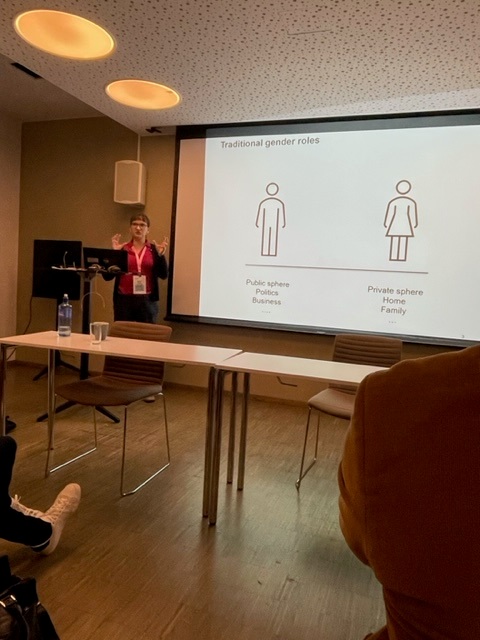
Magin, M., Haßler, J., Larsson, A. O. & Skogerbø, E. (2023, August 16-18). Shaped by gender stereotypes? Comparing the election campaigns on Facebook and Instagram by female and male top politicians in Norway and Germany. NordMedia 2023, Bergen, Norway.
DigiWorld at ICA 2023
This year’s International Communication Association (ICA) Conference was held from May 25-29 in Toronto, Canada. The DigiWorld Team presented results from their research on digital campaigning in national election contexts at the main conference. Marton Bene and Jörg Haßler presented results from a study led by Hedvig Tønnesen on the effect of policy issues on Facebook on user reactions in national election campaigns in Germany, Hungary, and Norway. Another talk by Jörg Haßler focused on how visual (self-) personalization on Instagram pages of parties and politicians during election campaigns has changed over time and whether it comes at the cost of addressing policy issues.
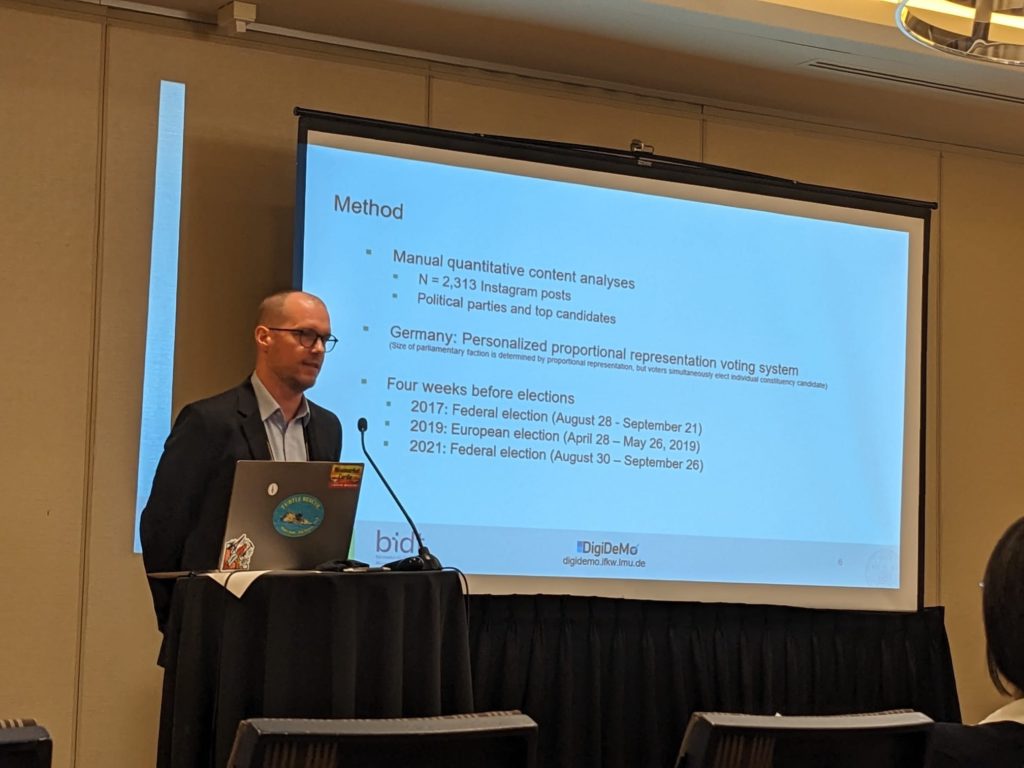
The members also met for a business meeting to discuss their current work and future directions. We thank all partners who were present and/or contributed to the projects.
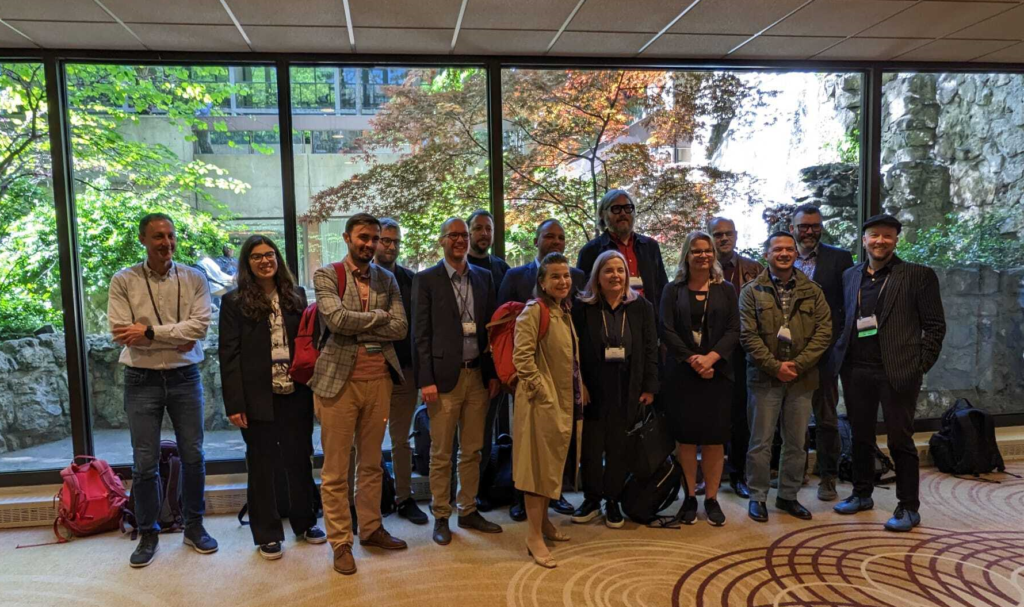
Pre-Conference at ECREA 22
DigiWorld Pre-Conference of ECREA 2022 in Aarhus, Denmark, 19 October 2022
Uta Russmann and Yossi David organized the ECREA pre-conference „Digital Election Campaigning Worldwide“ where researchers both from the DigiWorld network and beyond presented research findings on digital campaigning and social media communication of parties and politicians during national elections in various countries around the world. Anders Olof Larsson, Delia C. Balaban and Martina Novotná presented results of their research on national elections in Norway, Romania, and the Czech Republic. Further presentations on online election campaigning in Australia, the US, Germany, Portugal, Greece, Sweden broadened the international perspective of this pre-conference.
DigiWorld Panel at ECREA 22
ECREA 2022, 9th European Communication Conference in Aarhus, Denmark, 19-22 October 2022
Members of the DigiWorld team presented results from their research on digital campaigning in national election contexts in the joint panel „They have an issue. How political issues shape social media campaigns in national election campaigns across Europe“, chaired by Melanie Magin and Márton Bene, at the ECREA 2022 conference in Aarhus, Denmark. In this panel, Anna-Katharina Wurst, Márton Bene, Dren Gërguri, Mihnea Stoica and Melanie Magin focused on the prevailing political issues being discussed by parties and politicians in the national election campaigns in Germany, Hungary, Albania and Kosovo, Romania and the Republic of Moldova, as well as Norway.
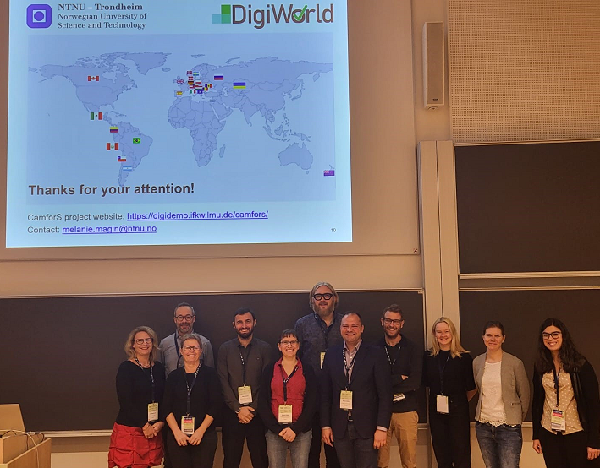
Keynote from Anders Olof Larsson
Political Participation Networks on Facebook colloquium, September 16th 2022
Anders Olof Larsson, a valued Member of the DigiWorld Team, was recently invited to deliver a keynote in Lisbon at the colloquium Political Participation Networks on Facebook which was hosted by the ICNOVA (NOVA Institute of Communication). The colloquium marked the end of a research project, which documented the communication activities of different political actors on Facebook during the election year 2019. The research project was hosted by the ICNOVA and coordinated by Jorge Martins Rosa. Anders Olof Larsson, who is a Professor with the Department of Communication at the Kristiania University College, presented his ongoing work on political parties‘ Facebook campaigning.
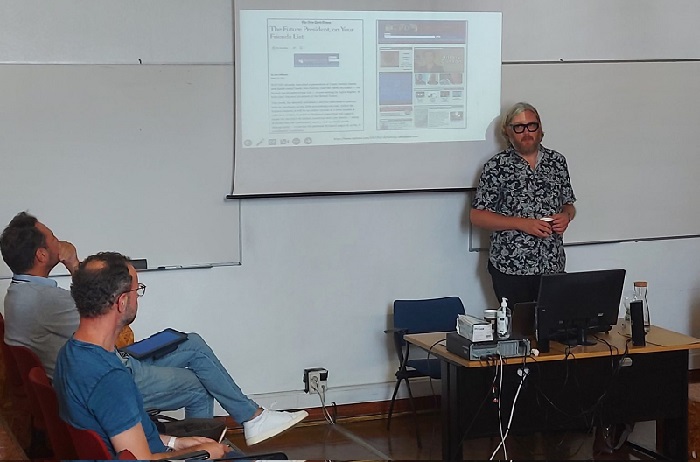
Annual Conference of the ICA in Paris
72nd annual ICA Conference, Paris 26-31.05.2022
Several members of the DigiWorld Team presented their work at this year’s annual conference of the ICA in Paris, from May 26th to May 31st. It was a great opportunity to meet, have a discussion and/or get to know each other. We are grateful for the wonderful cooperation with all project partners. A big thank you to all partners who were present, but also to all who could not be there.
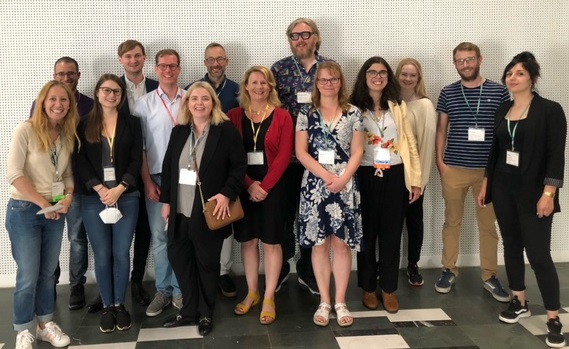
Call ECREA-Preconference 2022
CfP ECREA 2022 Pre-conference: “Digital Election Campaigning Worldwide”
Call for Papers (deadline for submission: 1 May 2022)
Wednesday, 19 October 2022
Aarhus (Denmark)
Call ECREA-Preconference 2022
The ECREA pre-conference is organized by DigiWorld ( https://digidemo.ifkw.lmu.de/digiworld/), a scientific collaboration network of scholars that aims at international comparisons of election campaign strategies in digital communication channels, which currently is bringing together researchers from 17 countries. The long-term goals of DigiWorld include building a continuous research network dealing with digital campaigning, user engagement, and factors influencing it. The pre-conference, however, is open to researchers both from and beyond the DigiWorld network.
The health of digital democracy has become under attack from political actors who actively use social media to spread disinformation and hate speech. To what extent are these (digital) propaganda techniques used in democracies during election times? How do they affect democratic processes and participation? We want to answer these questions by revealing and comparing the online communication of parties and politicians across the political spectrum on social media during national elections in various democracies.
To discuss the use of communication strategies of party and candidate accounts on social media platforms during national elections, we are particularly interested in bringing together scholars who explore the use of such platforms in the local and international arena from both the global north and the global south. It especially welcomes contributions that explore this phenomenon from a comparative perspective between social and cultural groups
The pre-conference welcomes contributions on, but is not limited to:
o Digital propaganda, campaigning, and democracy
o Social media and disinformation in election campaigns
o Elections and online hate speech
o Methodological issues in research of elections and social network sites
o Ethical dilemmas in research of elections and social network sites
o Comparative approaches for studying digital propaganda, campaigning, and online hate speech
Abstracts of 300 words excluding references must be sent to Yossi David ( ydavid@uni-mainz.de) and Uta Russmann ( uta.russmann@uibk.ac.at) no later than May 1st, 2022.
The pre-conference will take place in person in Aarhus (Denmark) on October 19th, 9 to 15 (CEST).
Timeline:
Deadline for submission of abstracts: May 1st, 2022
Notification of acceptance: June 1st, 2022
Deadline for registrations: September 1st, 2022
Pre-conference: October 19th, 2022, 9-15 (CEST)
• The 2020 New Zealand election campaign
NZvotes – live Blog and podcast on the election
Over the last four weeks of the 2020 New Zealand general election campaign, the New Zealand subteam of the DigiWorld project („New Zealand Social Media Study (NZSMS)”), led by Dr Mona Krewel and Professor Jack Vowles, has live coded the Facebook campaigns of the parties and candidates in the New Zealand election and published their preliminary results in weekly blog posts and a podcast to inform New Zealand’s voters about what has been going on the social media campaigns of the parties and the candidates. Their blogposts among many other aspects of the campaign covered the political issues thematized in the New Zealand election, the use of dirty campaign techniques such as negative campaigning, fake news and half-truth by the parties and candidates, their use of populist language, voter mobilization attempts by the parties, the informational value of the campaigns for voters, and many other topics.
See links to their blog posts and the podcast below.
“#nzvotes: The dynamics of campaign communication on Facebook”
“Negative campaigning, fake news, and half-truths among the minor parties. And the question: is Advance New Zealand really ‘populist’?”
„New Zealanders deserve a positive election,“ said PM Jacinda Ardern. But are they getting it?”
“From dirty dairying to dirty campaigning? The duel between Jacinda Ardern and Judith Collins on Facebook”
Podcast: “New Zealand election 2020: Key Social Media Trends”
